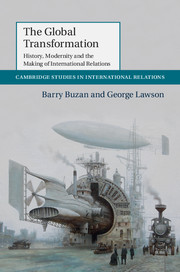Preface
Published online by Cambridge University Press: 05 February 2015
Summary
This project originated in our shared interest in modernity and our shared frustration at the lack of awareness of its importance in International Relations (IR). Working together at the LSE gave us the opportunity to talk about the book’s main ideas, and both of us were in different ways guided towards this project by the influence of Fred Halliday and Justin Rosenberg. Fred always made a big deal of the nineteenth-century disjuncture, even though most people in IR were resistant to his promptings. Justin’s work on both modernity and uneven and combined development provided another shared stimulus. We dedicate this book to both of them, and hope that it might stand as a vindication of Fred’s campaign to turn the IR supertanker.
We would like to thank Carmen Gayoso, Mark Kersten and Luca Tardelli for their extremely helpful research assistance, and for always delivering more than we asked for. Luca in particular has worked on a number of different parts of the book, providing both materials and insights that have greatly strengthened our argument. Kirsten Ainley gave us good advice on the history of International Law. Especially big thanks to Mathias Albert, Tarak Barkawi, Pinar Bilgin, Andrew Linklater, Richard Little, Jeppe Mulich and Justin Rosenberg for reading the whole manuscript and providing comments on it, and to Vivien Barr and Harvey Chisick for comments on particular aspects of our argument. Thanks also to the Cambridge University Press reviewers who commented on the proposal and the manuscript. Whether or not we agreed with all the comments we received, our community of scholars made us think hard about what we wanted to say, and we are deeply grateful for their collegial insight and support. Our gratitude also to Cambridge University Press, particularly Carrie Parkinson for being extremely helpful with the production process, and John Haslam for his encouragement, and sometimes tolerance, of our project.
- Type
- Chapter
- Information
- The Global TransformationHistory, Modernity and the Making of International Relations, pp. xv - xviiPublisher: Cambridge University PressPrint publication year: 2015

